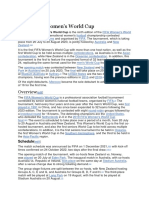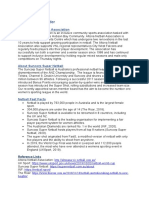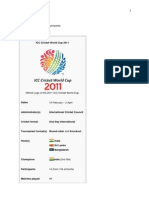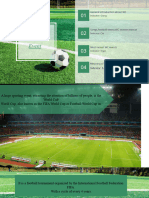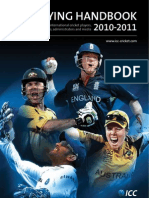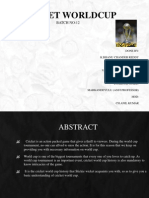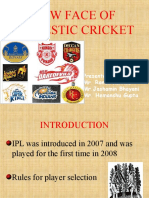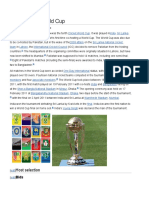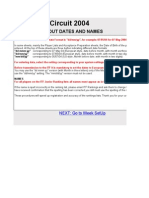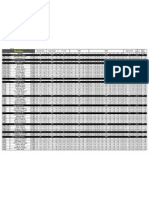International Cricket Council (ICC) Cricket World Cup
International Cricket Council (ICC) Cricket World Cup
Uploaded by
Harsh GuptaCopyright:
Available Formats
International Cricket Council (ICC) Cricket World Cup
International Cricket Council (ICC) Cricket World Cup
Uploaded by
Harsh GuptaOriginal Description:
Original Title
Copyright
Available Formats
Share this document
Did you find this document useful?
Is this content inappropriate?
Copyright:
Available Formats
International Cricket Council (ICC) Cricket World Cup
International Cricket Council (ICC) Cricket World Cup
Uploaded by
Harsh GuptaCopyright:
Available Formats
Engaging one fifth of the
Worlds population
Worlds toughest players,
Worlds toughest backyard.
International Cricket Council (ICC) Cricket World Cup:
The ICC Cricket World Cup (CWC) is the showpiece event of the cricket calendar and takes place
every four years, with matches contested in the one-day, 50 over format. The CWC2015 will be
jointly hosted by Australia and New Zealand. Some of the key statistics of the CWC2015 include:
It is one of the worlds true global sporting events
14 countries compete - engaging one fifth of the worlds population
Potential television audience of 953 million people across 182 territories
8,000 accredited media
Over 400 accredited players and officials
National footprint across both countries
It will showcase Australia and New Zealands business, sport, tourism and trade
opportunities
The first CWC contest was organised in England in 1975. A separate Women's Cricket World Cup
has been held every four years since 1973. Previous and future hosts as well as winners of the ICC
Cricket World Cup tournament are detailed below:
Year Host Nation(s) Final Venue Winner
1975 England Lord's, London West Indies
1979 England Lord's, London West Indies
1983 England Lord's, London India
1987 India, Pakistan Eden Gardens, Kolkata Australia
1992 Australia, New Zealand MCG, Melbourne Pakistan
1996 India, Pakistan, Sri Lanka Gaddafi Stadium, Lahore Sri Lanka
1999 England Lord's, London Australia
2003 South Africa Wanderers, Johannesburg Australia
2007 West Indies Kensington Oval, Bridgetown Australia
2011 India, Bangladesh, Sri Lanka Wankhede Stadium, Mumbai India
2015 Australia, New Zealand Not designated -
2019 England Not designated -
Tournament Format:
The finals of the CWC2015 are contested by all ten full member nations of the ICC, together with
four other nations that become eligible through the World Cup qualifying programme.
A new 50-over League has been introduced to serve as the qualifying programme for the
CWC2015. The top two teams in the eight team 50-over League will qualify automatically for the
CWC2015 and the remainder of the teams will be joined by the teams finishing 3rd and 4th in the
Pepsi World Cricket League Division 2 (the top two teams will compete in the new League) to
decide the remaining two qualifiers. The event will take place at a venue and on a date still to be
decided.
The 2015 ICC Cricket World Cup match schedule is currently under discussion between the LOC
and ICC.
About the tournament logo:
The tournament logo was unveiled in Mumbai on 2 April
2011.
More than just a symbol of cricket, the tournament logo is
an expression of the Australian and New Zealander culture
that highlights the unique flavour that will characterise the
ICC Cricket World Cup 2015 to the millions of international
cricket fans.
The tournament logo brings together indigenous motifs
from both Australian (Aboriginal) and New Zealand (Maori)
indigenous cultures to form the distinctive shape of a
batsman playing a hook shot.
The Maori and Aboriginal motifs signify toughness, glory,
resilience, connection and belonging.
Each element of the tournament logo contributes to building the story of the ICC's flagship event
featuring the best players in the world competing for The Cup That Counts. The selected motifs
are:
Maori Tohora symbolising toughness, pride and tribal culture.
Aboriginal journey tracks symbolising spirit of the land.
The colours of the tournament logo are inspired by the Australian and New Zealand natural
landscapes.
Data from the recent 2011 ICC Cricket World Cup included:
TV - a worldwide potential television audience of 953 million people across 163 territories
Fans - 1.23 million spectators across 49 matches (75% of total capacity)
Social - 1100% increase of Twitter account users and 45% increase of Facebook users
during the tournament
Web Over 21 million global unique visitors to the official event website
8,000 accredited media, 375 accredited players & 35 accredited match officials
You might also like
- The History of Morton F.C. (1874-2011)Document66 pagesThe History of Morton F.C. (1874-2011)DutchGableHouseNo ratings yet
- Presentation 3Document8 pagesPresentation 3kumarpradeep10236No ratings yet
- The Cricket World CupDocument2 pagesThe Cricket World CupJisan JamilNo ratings yet
- 2011 Cricket World CupDocument16 pages2011 Cricket World CupRakesh Dey SarkarNo ratings yet
- Presentation Saqib Mehmood Bs (TN) 1: Cricket World CupDocument11 pagesPresentation Saqib Mehmood Bs (TN) 1: Cricket World CupPrince AtifNo ratings yet
- The Explosion Made Her Immediately DizzydorqrDocument2 pagesThe Explosion Made Her Immediately Dizzydorqrthingnorth33No ratings yet
- Cricket and Its EconomyDocument10 pagesCricket and Its Economyanonymous210990No ratings yet
- Event ManagementDocument25 pagesEvent ManagementRohan Sharma100% (1)
- ICC Study GuideDocument22 pagesICC Study Guideshilpikinwar2013No ratings yet
- Event Management Assignment ON Icc Cricket World CupDocument26 pagesEvent Management Assignment ON Icc Cricket World CupPetar Stojanovic100% (1)
- Presentation ON Commonwealth Games: Presented byDocument33 pagesPresentation ON Commonwealth Games: Presented byKulvinder SinghNo ratings yet
- Chess Olympiad 2022 Sponsorship DeckDocument16 pagesChess Olympiad 2022 Sponsorship Deckomm2500No ratings yet
- World Football Gala - Presentation For GuestsDocument9 pagesWorld Football Gala - Presentation For Guestsalcabre1No ratings yet
- Cricket World Cup 2011Document15 pagesCricket World Cup 2011Biplav KumarNo ratings yet
- Ashwini Project1Document76 pagesAshwini Project1ashwini69No ratings yet
- 2011 Cricket World CupDocument14 pages2011 Cricket World CupFebin ShajiNo ratings yet
- 2023 FIFA Women CupDocument48 pages2023 FIFA Women CupomuhnateNo ratings yet
- IGP 2023 Hobbies - CricketDocument18 pagesIGP 2023 Hobbies - Cricketgautampoptani.websiteNo ratings yet
- My Favorite Sport CricketDocument5 pagesMy Favorite Sport CricketMr. Rohi And BhaveshNo ratings yet
- ICC Cricket World CupDocument33 pagesICC Cricket World CupSobha JosephNo ratings yet
- Indian Weekender 3 April 2015Document32 pagesIndian Weekender 3 April 2015Indian WeekenderNo ratings yet
- Daily Current Affairs Capsule: 23 June 2019Document6 pagesDaily Current Affairs Capsule: 23 June 2019PoornimaNo ratings yet
- Media BackgrounderDocument1 pageMedia Backgrounderapi-521001568No ratings yet
- KAIST International Student Association: March 5, 2010Document7 pagesKAIST International Student Association: March 5, 2010Say Say Barrok100% (3)
- Indian Premier League (IPL) India's Virtual Casino: By:-Kavish Sachar (100904037)Document29 pagesIndian Premier League (IPL) India's Virtual Casino: By:-Kavish Sachar (100904037)Kavish SacharNo ratings yet
- CricketDocument1 pageCricketSheshendra MokaNo ratings yet
- 2011 Cricket World CupDocument19 pages2011 Cricket World CuprajnishddlNo ratings yet
- Indian Cricket 1Document2 pagesIndian Cricket 1biydhoulwgNo ratings yet
- Commonwealth Games Upsc Notes 39Document9 pagesCommonwealth Games Upsc Notes 39upanshu176049No ratings yet
- Project Management Life Cycle: Assignment OnDocument13 pagesProject Management Life Cycle: Assignment OnShafiq KhanNo ratings yet
- Where It All Started?Document12 pagesWhere It All Started?vidhikachruNo ratings yet
- Tienganh Nhóm 4Document21 pagesTienganh Nhóm 4Trần LinhNo ratings yet
- Texto 2 - Marketing No DesportoDocument15 pagesTexto 2 - Marketing No DesportotomasoliveiraticNo ratings yet
- CWG Scam 2010Document44 pagesCWG Scam 2010Shailesh MaliNo ratings yet
- Cricket TutorialDocument26 pagesCricket TutorialAsad ZahidiNo ratings yet
- Volunteer Handbook - Manchester 2008Document15 pagesVolunteer Handbook - Manchester 2008Juan ChongNo ratings yet
- Swetansh ProjectDocument2 pagesSwetansh ProjectaadvikdixitNo ratings yet
- Analysis Report: (ICC Cricket World Cup 2011: The Game)Document8 pagesAnalysis Report: (ICC Cricket World Cup 2011: The Game)Abdul Ahad JawaidNo ratings yet
- ATTENDANCEDocument1 pageATTENDANCEprksh27pkNo ratings yet
- ICC Cricket Playing Handbook 2010 2011Document427 pagesICC Cricket Playing Handbook 2010 2011shubham665No ratings yet
- The T20 World Cup 2024 Promises to Be Thrilling SpectacleDocument1 pageThe T20 World Cup 2024 Promises to Be Thrilling Spectaclekrishanusarma48No ratings yet
- Sports - Current AffairsDocument16 pagesSports - Current Affairspanil84No ratings yet
- Cricket World CupDocument58 pagesCricket World CupJay DabhiNo ratings yet
- IccDocument3 pagesIccparaskhetanikkNo ratings yet
- Cricket Worldcup: Batch No:12Document14 pagesCricket Worldcup: Batch No:12Mahesh ReddyNo ratings yet
- "Promotional Strategies of IPL": - Presented by KalaiDocument19 pages"Promotional Strategies of IPL": - Presented by KalaiPraveen RajanNo ratings yet
- Squash at the Olympic Games Los Angeles 2028 Everything You Need to Know About the New Sport at LA28Document1 pageSquash at the Olympic Games Los Angeles 2028 Everything You Need to Know About the New Sport at LA28shhtangiwNo ratings yet
- New Face of Domestic Cricket: Presented By: Mr. Ronak Kakkad MR - Jashamin Bhayani Mr. Hemanshu GuptaDocument27 pagesNew Face of Domestic Cricket: Presented By: Mr. Ronak Kakkad MR - Jashamin Bhayani Mr. Hemanshu GuptaHemanshu GuptaNo ratings yet
- SPORTS JOURNALISM - International Cricket CouncilDocument16 pagesSPORTS JOURNALISM - International Cricket CouncilTisha ChoudharyNo ratings yet
- This Article Is About The MenDocument3 pagesThis Article Is About The MenDurga Ramesh KNo ratings yet
- Sports NewsDocument15 pagesSports Newsjerry tomNo ratings yet
- English SportDocument7 pagesEnglish Sportapi-327260682No ratings yet
- ICC Handbook PDFDocument427 pagesICC Handbook PDFNiharPalweNo ratings yet
- World Archery March 2012: François de MASSARY (FRA)Document16 pagesWorld Archery March 2012: François de MASSARY (FRA)Craig Daalmeijer-PowerNo ratings yet
- Nepal Cricket 1Document2 pagesNepal Cricket 1sxdcpokubpNo ratings yet
- 2011 Cricket World Cup: Host SelectionDocument5 pages2011 Cricket World Cup: Host Selectionsandeep_chauhan789No ratings yet
- The Kwepena League TKLDocument5 pagesThe Kwepena League TKLhellofocusfeatsNo ratings yet
- Cricket TutorialDocument22 pagesCricket Tutorialvettiman100No ratings yet
- Learn All About CRICKET: Techniques, Equipment, Top Players And Strategies - DemystifiedFrom EverandLearn All About CRICKET: Techniques, Equipment, Top Players And Strategies - DemystifiedNo ratings yet
- Understanding Cricket: A Guide to Playing, Watching, and Enjoying the SportFrom EverandUnderstanding Cricket: A Guide to Playing, Watching, and Enjoying the SportNo ratings yet
- ITF World Tennis Tour Acceptance Lists Explained:: $15,000 TournamentsDocument9 pagesITF World Tennis Tour Acceptance Lists Explained:: $15,000 TournamentsBISWAJIT MOHANTYNo ratings yet
- Res ClassDocument7 pagesRes ClassEduardo AranguizNo ratings yet
- Spices Board Service (Classification, Control and Appeal) Regulations, 1992Document22 pagesSpices Board Service (Classification, Control and Appeal) Regulations, 1992Latest Laws TeamNo ratings yet
- Rugby World Cup 2011Document3 pagesRugby World Cup 2011Jaly ZenNo ratings yet
- Arsenal Chants LyricsDocument5 pagesArsenal Chants LyricsKhalid Theo OznNo ratings yet
- Società Sportiva Lazio (: Italian PronunciationDocument4 pagesSocietà Sportiva Lazio (: Italian PronunciationMehaNo ratings yet
- Si Ganas Te Apuesto Te Paga Al Toque: Juventus Vs RomaDocument17 pagesSi Ganas Te Apuesto Te Paga Al Toque: Juventus Vs RomaheribertoNo ratings yet
- French Ligue 1: TGL & Jam Nama Tim Han P. Skor P. 1X2 O/E P. O/UDocument5 pagesFrench Ligue 1: TGL & Jam Nama Tim Han P. Skor P. 1X2 O/E P. O/UDewa Made WirraNo ratings yet
- Premier League Kit InstructionsDocument23 pagesPremier League Kit InstructionsadammzjinNo ratings yet
- Some of The Legendary Cricketers of Indian CricketDocument17 pagesSome of The Legendary Cricketers of Indian CricketDebraj MukherjeeNo ratings yet
- Lista Inspectorilor de Specialitate Daune Groupama Asigurari 0 0 2 1Document8 pagesLista Inspectorilor de Specialitate Daune Groupama Asigurari 0 0 2 1Robert BadeaNo ratings yet
- 2022 UCI XCO World Championships Les Gets Junior Women AnalysisDocument4 pages2022 UCI XCO World Championships Les Gets Junior Women AnalysisFullGasMTBNo ratings yet
- FiFA Schedule 2018-2024Document7 pagesFiFA Schedule 2018-2024tech pkNo ratings yet
- Startng List 3rd DayDocument2 pagesStartng List 3rd Dayapi-310333466No ratings yet
- Nationals SpreadsheetDocument22 pagesNationals SpreadsheetdougreaderNo ratings yet
- TennesseeDocument5 pagesTennesseedarkrain777No ratings yet
- Manchester United Youth Academy Focus On Small-Sided GamesDocument4 pagesManchester United Youth Academy Focus On Small-Sided Gamesjackjensen2852No ratings yet
- Qualifying Ipoh 2010 FinalDocument109 pagesQualifying Ipoh 2010 Finalzigong65No ratings yet
- 2019 AFL Premiership Season Fixture v2 PDFDocument1 page2019 AFL Premiership Season Fixture v2 PDFAnonymous AdZCu1No ratings yet
- History of Football in EnglandDocument17 pagesHistory of Football in EnglandAndrei ZvoNo ratings yet
- 2015 NCAA Division I Wrestling Championships 125 ChampionshipDocument10 pages2015 NCAA Division I Wrestling Championships 125 ChampionshipBrianne DyerNo ratings yet
- ee9cad50-c0d3-4c9a-a78f-42ec420c235aDocument19 pagesee9cad50-c0d3-4c9a-a78f-42ec420c235aarchanachandrawat224No ratings yet
- DataDocument69 pagesDataTahir FerozNo ratings yet
- Epl Fixtures 2013 14 PDFDocument15 pagesEpl Fixtures 2013 14 PDFIndrojit SahaNo ratings yet
- Skedina: Live Live LiveDocument11 pagesSkedina: Live Live LiveMartin KajaNo ratings yet
- Thursday PDFDocument9 pagesThursday PDFKakouris AndreasNo ratings yet
- AlabamaDocument5 pagesAlabamadarkrain777No ratings yet
- My Views On The Growth and Development of East Bengal Football ClubDocument5 pagesMy Views On The Growth and Development of East Bengal Football ClubSamikDasguptaNo ratings yet
- Superbet - Pariuri Sportive Online, Live, Casino, Loto, VirtualeDocument2 pagesSuperbet - Pariuri Sportive Online, Live, Casino, Loto, VirtualeDk GamingNo ratings yet
















